Message from Ty Eustice, Director of Wrestling Operations - J Robinson Camps
Since I started working for J a year ago, this is the quote that he goes to the most (which is really saying something if you know J at all, he has A LOT of sayings). He has challenged me and the entire staff to continue to improve and look for new ways to do things. Being a wrestler and coach at heart, I relate the meaning of this quote to what we call the “off-season.” For this blog, the off-season means all the time on the calendar that fall outside our regular high school or college wrestling season.
When we are pursuing major goals and trying to be great, there shouldn’t be an off and on, or time frames of when it’s appropriate to be working for those goals, we should ALWAYS be working for those goals. Are there training phases and scheduled time off? Yes. Are there max days and peaking days? Yes. We all need stretches of time off the mat, different levels of frequency and intensity in our training, but, all these smaller plans and phases and peaks and valleys should be a part of a bigger training cycle that never ends; basically, there is no off-season.
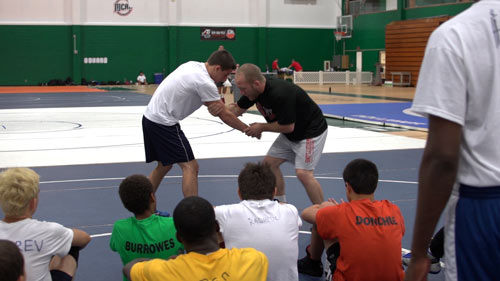
One of my biggest mistakes as a college wrestler was viewing this off-season time as an escape from wrestling, I talked myself into thinking that I needed to get away from the sport and that I needed to be away from the mat and the wrestling room. I was wrong, my thinking was wrong, my attitude was wrong, and it probably prevented me from really reaching my potential as an athlete. I could have changed my attitude and perspective and looked at the off-season time much differently. Don’t get me wrong, I was still getting workouts in and thinking about wrestling, but I didn’t have clear goals for my training. I needed to address specific wrestling positions and physical weaknesses. Without goals and a purpose for your training, you really aren’t working for anything and will not make the progress you desire.
How do you develop your off-season goals? After our regular season ends, we need to take a step back and evaluate our goals, but more importantly what we need to improve on to reach those goals. Oftentimes, wrestlers want to stick to the same schedule they’ve done before, because they’re comfortable doing those things. Does this mean that’s the right plan? Hardly. There’s another saying that goes: whatever you don’t feel like doing, that’s probably the thing you need to be doing. Usually, we don’t enjoy working in areas we are deficient at, so it makes sense that is where we need the most work. Example: you might hate the bottom position, it’s hard, it’s tough, when you walk in a wrestling room it’s the last position you want to work in. Well, as you can imagine, that’s an area where most kids struggle. I’m all for continuing to improve your strengths and make them unstoppable, but we have to be realistic and address the areas of concern as well.
SWEAT THE SMALL STUFF
Let’s start small and work our way to the bigger picture. Identify some small changes that need to be made before your next season begins. These small areas of concern can be worked on every day, therefore giving you daily direction and reward as well. You cannot wait until the FALL pre-season to try to improve, you’ve wasted the best time to make gains. Slow footwork, lack of explosiveness, poor single leg position, trouble getting your wrists free on bottom, lack of pulling power…..whatever it might be that you’ve addressed as a concern, it can be improved! It’s going to be uncomfortable, it’s going to take work, but anything worth wanting is going to require effort. The great thing is, just knowing that you spent time addressing a weakness, will result in a huge return on confidence. Also, anything you start doing now is more than you were doing before.
The great thing about the era we are in now is that any are of concern can be attacked a bunch of different ways. There is so much access to great information that there shouldn’t be any excuse for not trying to improve whatever problem you might be having. Slow feet? The world wide web is full of workout plans and devices that are free for anyone who is willing to do the research. Talk to a strength coach, ask a coach for help, find a buddy or teammate to work with every day. No explosiveness? Again, the knowledge that is out there now is amazing: lifting plans, plyometric training, training aids, workout videos. Not everything costs a lot of money. Do the research, ask the right questions, and get around people that want to improve. Wrestling specific problems? Broken record, but, there is so much information at your fingertips today it’s not even funny. Technique videos, YouTube, Flowrestling, all these things have made learning the finer details of the sport more accessible, take advantage. If you need a motivator, go watch Flowrestling’s video of John Smith “The Scientist”, if you can attack one area of your wrestling like he did the low-single, you will see positive changes. http://www.flowrestling.org/video/1028-John-Smith-The-Scientist
THE BIG QUESTIONS
How much time should I take off? Can I play other sports? Should I do freestyle/Greco? What summer camp should I go to? The short answer is: some, yes, yes, the right one for you. The long answer is long, and it’s different for every athlete. I don’t have all the right answers, there’s more than one answer. I think it comes down to evaluating yourself and what you want to get out of the sport. Realize that whatever you want, you’re going to have to give that much into it and then some.
Time off:
Of course we all need time after our season to rejuvenate and evaluate oneself. I would tell an athlete to view the time as part of the big process, you need this time to heal your body physically and to mentally move on from the season. If you’re reading this and you still haven’t touched your wrestling shoes since the state tournament, we’ve got problems. Training SHOULD NOT be as intense or demanding all year long- that’s just not practical- but that doesn’t mean we can’t do something every day to improve. Get back into it and start thinking about the coming season.
There’s other sports?
Yes, there are other sports besides wrestling- some great sports. If you’re dead-serious about wrestling, then view these other sports as a chance to improve your overall athleticism, coordination, conditioning, and competitive spirit. 2013 NCAA Champion Chris Perry was an All-State football player in Oklahoma. Recent U of Minn commits Jake Short and Nick Wanzek were standout football teammates and 3 sport athletes as well. The list goes on….. http://www.twincities.com/sports/ci_21419661/prep-football-jake-short-nick-wanzek-together-always
Applying the dedication learned in wrestling to other sports can be rewarding and help an athlete grow in different ways. College coaches have also become even more interested in seeing how athletes compete in other sports to gauge their character, competitiveness, and level of commitment to other areas of their life, outside their “best” sport. I still can’t get over the night Jim Zalesky drove up to Minnesota to watch me play high school football, and was rewarded by watching 2 balls go over my head, one for a touchdown (I played cornerback). I didn’t hear the end of it for 5 years, however, he later did say that he liked how mad I was at myself and the way I reacted to the adversity. I remember Marty Morgan coming down to watch a football practice as well, to see me work in an off-the-mat setting.
Freestyle/Greco: There have been several recent articles on the pros of Spring and Summer wrestling, some really good stuff. There are no secrets: the same guys that are on top of podiums in March are the same guys that are traveling in the Spring and testing themselves against the country’s best. Committing fully to Spring wrestling will definitely limit your ability to play Spring High School sports, without question, but a balance can be found. This article is about wrestling, if wrestling is your focus, you need to be constantly challenging yourself and improving. Freestyle is a chance to compete, but also hone your skills in an environment that exposes any technical or tactical errors….severely. I can’t stand when a high school kid says they don’t like freestyle wrestling. It’s wrestling. If you want to get better, you need to wrestle. It’s the international style of wrestling. Now, more than ever, we need to challenge our youth wrestlers to think bigger than the local, regional, and national levels.
Summer wrestling makes Winter champions: *my one allotted cliché for this blog
It just comes down to how much you want to invest in the sport and what your goals are. I had a front row seat to all 3 days of the Minnesota High School State Tournament this year, it was so plainly evident who put in extra workouts in the off-season and who was committed to the sport.
Camps:
There is a ton of them: Intensive Camps, Technique camps, Team Camps, Competition Camps, Commuter Camps, Father-Son Camps, Resort Camps, Big-Man Camps….maybe more that I don’t know about! Wrestlers should evaluate themselves, ask their coach, talk with their parents, and decide what camp fits their needs. Be honest with yourself and identify what you need to improve on, let that shape your summer plans.
Intensive Camps: I like the individual nature of an intensive camp, you focus on yourself, you put your body through an uncomfortable training regimen, and you come out mentally tougher than you were before. J Robinson invented the INTENSIVE CAMP while coaching at Iowa; he thought it would be a good idea to show high school kids how to train like college guys. The one thing that no one else can do, that we can do, is spend the necessary time required to create an actual CHANGE in an athlete. 4-5-6-7 days is not an intensive camp, it is not enough time to bring about a permanent change in a human being. We also remove the distractions that are normally present in a kids’ life: friends, parents, coaches, girlfriends, video games, etc. It’s amazing what you can accomplish when you take someone out of their comfort zone and immerse them in one subject. Imagine if you traveled to an island with no distractions, surrounded by like-minded people with the same goals, being taught by the best teachers within a PROVEN curriculum for 10/14/28 days? It doesn’t matter what the subject matter or sport or activity is, you are going to produce a tremendous change in yourself! (28-day golf camp, anyone?) That’s what our Intensive Camps do: we create phenomenal changes in people that are willing to invest in themselves. The most gratifying thing about my job, now, is seeing that we are actually making a difference. Wrestling is one thing, it’s great and it’s important, but hearing from coaches and parents about how Jack or Tommy came back from camp a different person, that’s when you know you’re onto something. And don’t get it confused, the Intensive Camps are creating results on the mat (go to our Hall of Fame page)(also, TWO of the 2012 NCAA DI Individual National Champs were 28-day graduates) But, there are lots of different teams and people running camps; do the research, try to find the right fit for you. Maybe you like a certain style, or who is running the camp. Maybe you want to develop a certain move or position, or develop a particular mindset. Even if you go to a non-JROB camp, at least you are working towards a goal. Goals are the key, make sure you set them; otherwise you’re just punching the clock with no direction.
Every day, week, month, workout, or training phase is all part of a bigger training cycle that never ends. There is never an “off-season” when you’re trying to better yourself. I hope to see some of you at camp this summer; you can find J and me in the dorms as always.
-Ty Eustice
To see an overview of the 2013 Intensive Camp training season, check out the video below:
J Robinson Intensive Wrestling Camps Webinar Series: Why JROB Camps? from J Robinson on Vimeo.



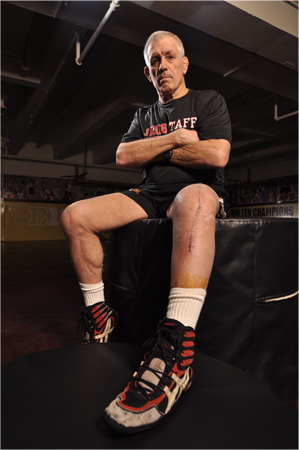
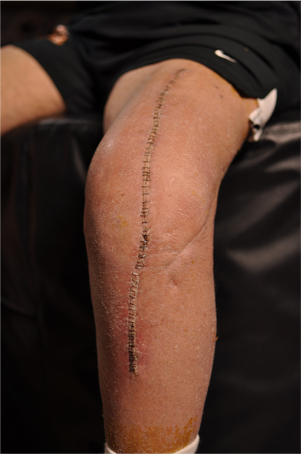
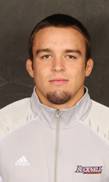
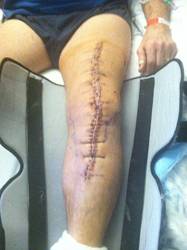 A word many of us hear many times and places throughout our life. During this past two weeks’ time I had the chance to address it again as I have many different times and situations.
A word many of us hear many times and places throughout our life. During this past two weeks’ time I had the chance to address it again as I have many different times and situations.